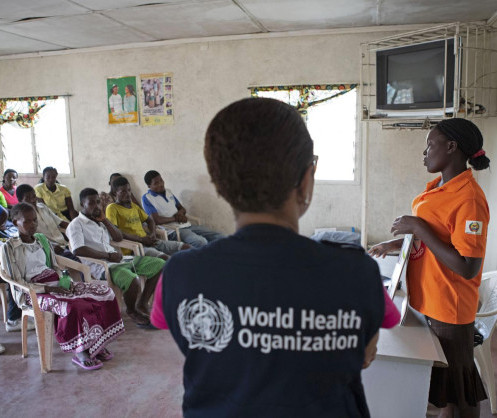A traumatic motor accident marked a turning point for Mariama Issifu. It was during treatment for her injuries that the 37-year-old teacher was first diagnosed with bipolar disorder.
But instead of gaining clarity on her condition, she says, she was treated poorly by care providers.
“I was already in an uncomfortable situation because I was still trying to understand,” recalls Mariama, a resident of the Bongo District in the Upper East region of Ghana. “Given my low self-esteem and lack of information, the healthcare officials took advantage to treat me inhumanely, something I struggle to forget.”
“The experience I went through in my quest to access healthcare made me wonder if I was not better off staying home without going to a hospital,” she adds.
There have been reports of human rights violations against people with mental health conditions, with some service users suffering coercion and forced treatment. To avoid mistreatment, many opt for treatment by faith-based and traditional healers.
Additionally, Ghana’s mental health service system faces inadequate qualified mental health professionals. There are only 39 psychiatrists (0.13 per 100 000 people) for the entire population of whom an estimated 2.3 million people have mental health conditions and need care.
This means scant access to care for people like Mariama, who live with mental health conditions in rural areas where only 2% receive psychiatric treatment and support. Significant underfunding has constrained mental health service delivery.
In response, the government of Ghana has been making efforts to improve mental health service delivery through its National Mental Health Policy 2019–2030.
In line with this policy, WHO, with funding from the United Kingdom Foreign, Commonwealth & Development Office (UK-FCDO), launched a three-year QualityRights Initiative in 2019 to improve quality of care and promote the human rights of people living with mental health conditions.
“We need mental health care services that are not only accessible, but also respect human rights in addressing the needs of patients,” says Dr Joana Ansong, Technical Officer, Non-Communicable Disease Risk Factors at World Health Organization (WHO) Ghana.
We need mental health care services that are not only accessible, but also respect human rights in addressing the needs of patients
The QualityRights Initiative, rolled out on a national scale, involves face-to-face and e-training of mental health service providers, caregivers, teachers, police service personnel, social welfare officials, the judicial service and persons with lived experiences. As of June 2022, more than 21 000 people had received training through the out of the target of 50 000.
The initiative is helping to address the issue of rights and access to dignified treatment for mental health conditions by making available the e-training programme with online coaching on mental health, human rights and recovery whilst ensuring the provision of holistic services that comply with recovery principles and international human rights standards.
The e-training is now a semester course in Human Rights and Mental Health for Community Mental Health and Rehabilitation specialists of the Ghana College of Nurses and Midwives. Following the curriculum inclusion, 26 students have successfully completed their training and earned a certificate in Diploma in Human Rights.
“The WHO QualityRights Initiative is a truly innovative programme for transforming lives of people with mental health conditions,” notes Susan Adwoa Mensah, Social Development Adviser for FCDO. “The UK is honoured to have partnered with WHO to promote attitudes and practices that respect dignity and rights, and holistic, person-centred care and support.”
For service providers like Dr Ramata Seidu, a Resident in Psychiatry, the QualityRights Initiative is improving their service provision.
“There were so many subtle forms of inappropriate use of my authority as a doctor that I did not realize,” she admits. “I have come to appreciate how my authority can be exercised with respect and dignity.”
David Naboare, President of the Ghana National Association of Community Mental Health Officers, concurs.
“The problem with many of us is that we think we must use all means necessary to treat mental health patients and that’s why on daily basis we see aggression and coercion of service users in our facilities, pushing them to stay away from seeking care,” he says. “My practice as a mental health professional has changed tremendously. Through the online discussion forums, peer learning and coaching, I have now learnt to involve my clients in decisions concerning their health.”
He has also been sharing his newfound perspective with colleagues.
“Together, we are beginning to build a better rapport with service users,” he says.
The impact of the initiative has not been lost on service users such as Mariama.
“Reception and treatment have greatly improved,” she enthuses, “and the trainings have empowered me to assert my rights to quality care.”
In addition to the QualityRights Initiative, WHO and partners are set to begin implementation of a WHO Special Initiative for Mental Health in the third quarter of 2022 following an official launch of the Initiative in July. It is a five-year project which aims to improve access to integrated quality person-centred mental health care for another 5.2 million Ghanaians by advancing mental health policy, advocacy and human rights.







OTHER ARTICLES
Editorial — Prevent, inform, and act for women’s health in Africa
Kenya : Government Prioritises Maternal Health and Strengthens Support for Community Health Promoters
Strengthening pandemic prevention, preparedness, and response capacities in Senegal using the “One Health” approach